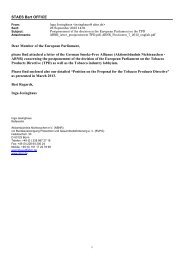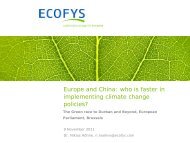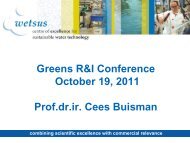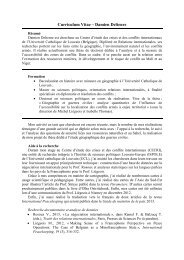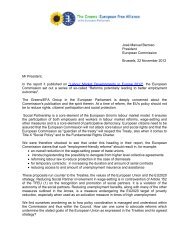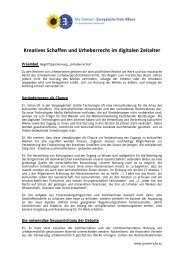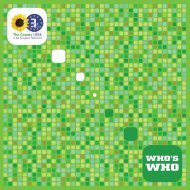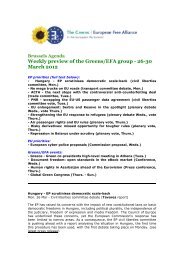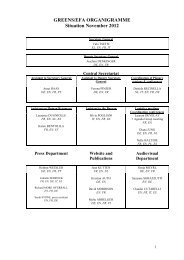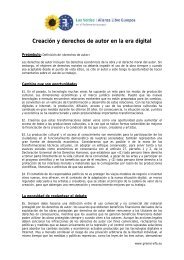Agro-Biotechnology: - The Greens | European Free Alliance
Agro-Biotechnology: - The Greens | European Free Alliance
Agro-Biotechnology: - The Greens | European Free Alliance
Create successful ePaper yourself
Turn your PDF publications into a flip-book with our unique Google optimized e-Paper software.
4 | Cloned farm animals - a ‚killing application‘? | Summary<br />
Summary<br />
<strong>The</strong> cloning of animals for food production has raised political discussions in<br />
the <strong>European</strong> Union. <strong>The</strong> <strong>European</strong> Commission is in favour of regulating food<br />
products derived from cloned animals under the Novel Food Regulation. <strong>The</strong><br />
<strong>European</strong> Council recommended including food derived from cloned animals<br />
and their offspring under the Novel food regulation and later supporting a specific<br />
piece of legislation for cloned animals. In 2008 the <strong>European</strong> Parliament<br />
voted for an immediate ban to avoid products reaching the market, and the<br />
cloning of animals cannot be done without permission.<br />
This report identified several levels that are impacted by cloning animals for<br />
food production and will need specific regulation:<br />
Animal welfare: Many adverse health effects are reported in cloned animals<br />
and their surrogate mothers. 1 Further, higher productivity in farm animals is<br />
correlated with shrinking biological diversity, shorter lifespan and higher incidence<br />
of damage to health. It is likely that cloning will foster this development.<br />
Transparency and traceability: <strong>The</strong>re is some likelihood that genetic<br />
material derived from cloning farm animals (such as semen and embryos) has<br />
already reached the <strong>European</strong> market on the level of farm production. <strong>The</strong>re<br />
is a high risk that this material is disseminated throughout the populations<br />
without any transparency and traceability.<br />
Farm production: Patents on cloned animals and their offspring will enforce<br />
new dependencies for farmers and breeders, and the process of concentration<br />
in the animal breeding business will be fostered. This can also have an impact<br />
on biological biodiversity in farm animals.<br />
Food production: If the products from cloned animals are introduced into<br />
the food market, high costs for labelling and segregation can arise. Consumers<br />
will need a high degree of transparency to enable them to make well-founded<br />
choices.<br />
Food safety and food market: Further investigations concerning food safety<br />
(e.g. different milk composition) are needed. In the light of the variety of factors<br />
impacting the outcome of cloning and the broad range of observed effects,<br />
health risks cannot be excluded for the time being. Consumers risk beingturned<br />
into some 'end of pipe hostage', not unlike the way that they are already<br />
caught by the usage of genetically engineered plants. Opinion polls show substantial<br />
consumer rejection 2 .<br />
Future developments: Cloning of animals for food production could pave a<br />
way to the introduction of further biotechnologies for engineering in livestock.<br />
1 Female animals carrying the cloned animal till birthing<br />
2 <strong>The</strong> task of the EGE is to examine ethical questions arising from science and new technologies<br />
and on this basis to issue Opinions to the <strong>European</strong> Commission in connection with the preparation<br />
and implementation of Community legislation or policies; http://ec.europa.eu/european_group_ethics/<br />
index_en.htm



